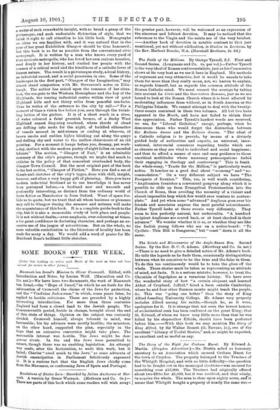The Faith of the Millions. By George Tyrrell, S.J. First
and Second Series. (Longman and Co. Cs. per voL)—Father Tyrrell is the very ideal of Roman controversialists, just as his Communion shows at its very best as we see it here in England. His methods of argument are very attractive, but it would be unsafe to take them for more than they really mean, not, wo hasten to explain, as regards himself, but as regards the common attitude of the Roman Catholic mind. We mast correct the average by taking into account La Croix and the Osservatore Romano, just as we are bound to look at the Roman Church where it is least affected by moderating influences from without, as in South America or the Philippine Islands. We cannot attempt to deal with the twenty- three essays contained in these two volumes. All but two have appeared in the Month, and have not failed to obtain their due appreciation. Father Tyrrell's hardest words are reserved, we see, for "Liberal Catholics," except, perhaps, when he denounces those who would forget the distinction between the Ecclesia docens and the Ecclesia discens. "The ideal of a Catholic religion is to provide, by means of a divinely guided body of authorities and experts, an universal, inter- national, inter-racial consensus regarding truths which are as obscure as they are vital to individual and social happiness ; and thus to afford a means of sure and easy guidance to those uncritical multitudes whose necessary preoccupations forbid their engaging in theology and controversy." This is frank the whole essay, " Tracts for the Million," is particularly worth notice. It teaches us a good deal about "economy" and " ac- commodation." On a very different subject we have "The Prospects of Reunion." This, too, is well worth considering, "Anglicanism furnishes a convenient gangway along which it is possible to slide up from Evangelical Protestantism into the Church of Rome, thus avoiding the necessity of a violent and almost impossible leap which few would ever venture to contem- plate." And yet when some " advanced" Anglican goes over his friends and associates express the most painful astonishment. Father Tyrrell looks at these events very differently. They seem to him perfectly natural, but undesirable. "A hundred incipient Anglicans are scared back, or at least checked in their advance." We wonder whether it is so, or whether they are like the foolish young fellows who see on a notice-board : "To Cyclists : This Hill is Dangerous," but "coast" down it all the same.


































 Previous page
Previous page